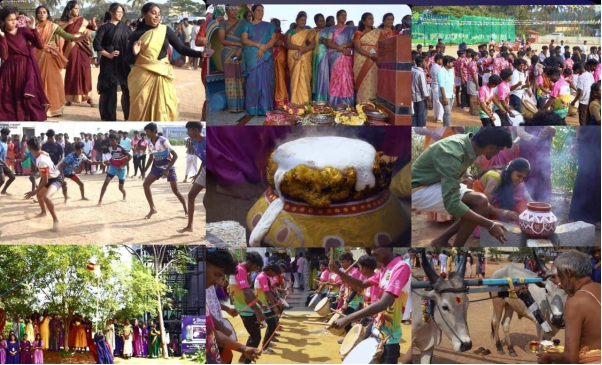
“FIRES OF TRADITION: SPARKING COMMUNITY SPIRIT DURING PONGAL – JAN 2024 “
Pongal, the vibrant harvest festival of Tamil Nadu, marks the beginning of the Tamil month “Thai” and is a time to express gratitude to the divine for blessings and to anticipate a prosperous year ahead. On January 12th, 2024, Sree Abirami College of Nursing embraced this cherished tradition with grandeur and enthusiasm, turning the campus into a hub of cultural festivities and joyful celebrations.
The day began early, with students asked to arrive by 8:15 a.m., adorned in traditional attire—dhotis and sarees—that added a splash of color and authenticity to the occasion. The college entrance was beautifully decorated with colorful **rangolis**, intricate designs drawn with powdered colors, setting a festive tone as everyone gathered. By 9:00 a.m., the campus was abuzz with excitement. The air was filled with the sounds of traditional music and the chatter of students, their faces alight with anticipation and joy.
Each department had been allocated a specific area within the college grounds to prepare its Pongal dish, fostering a sense of healthy competition and unity. Under the guidance of faculty members, students collaborated to cook the sweet rice delicacy that gives the festival its name. Large earthen pots were placed over firewood, and as the milk and rice began to boil, the atmosphere grew even more electric.
The official ceremony commenced with Dr. Renuga R., the esteemed Principal of Sree Abirami College of Nursing, lighting the firewood—a symbolic gesture inaugurating the festivities. As the rice boiled and bubbled over the pots, the crowd erupted in unison, chanting “Pongalo Pongal!” This overflowing of rice signifies abundance and prosperity, and the collective cheer expresses the shared joy and hopes of the community.
Following the initial rituals, Dr. Renuga added the first handful of rice to the pot, followed by professors and tutors, symbolizing unity and collaboration within the institution. The aroma of the cooking Pongal filled the air, mingling with the sounds of traditional instruments and students’ laughter.
The celebrations were not limited to cooking alone. The management had organized inter-departmental competitions to showcase traditional art forms. Students participated enthusiastically in various events, displaying talents in music, dance, and craftsmanship. The highlight was selecting the best Pongal dish, with winners awarded sugarcanes—a traditional symbol of the harvest—and other prizes.
An exciting addition to the day’s events was the traditional game of **”Uri Adithal.”** Participants were blindfolded and took turns trying to break a mud pot hanging from a rope with a stick, guided by the cheers and directions of the onlookers. The game elicited much laughter and camaraderie, reinforcing the communal spirit of the festival.
As the day progressed, sweet Pongal and sugarcanes were distributed to all attendees, allowing everyone to savor the fruits of their collective efforts. The sharing of food further enhanced the feelings of togetherness and gratitude that the festival embodies.
The festivities drew to a close with the announcement of competition winners. Applause and cheers filled the air as individuals and departments were recognized for their contributions and achievements throughout the day. The smiles on everyone’s faces were a testament to the success of the event.
Students and faculty departed with hearts full of joy and minds enriched by the cultural experience. The Pongal celebration at Sree Abirami College of Nursing was not just an event but a vibrant tapestry of tradition, unity, and happiness. It served as a reminder of the importance of cultural heritage and the joy that comes from coming together as a community.
As the sun set on the festivities, there was a collective sense of fulfillment and anticipation for the year ahead. The memories created on this day would be cherished by all, marking yet another joyous chapter in the college’s rich tapestry of traditions.
